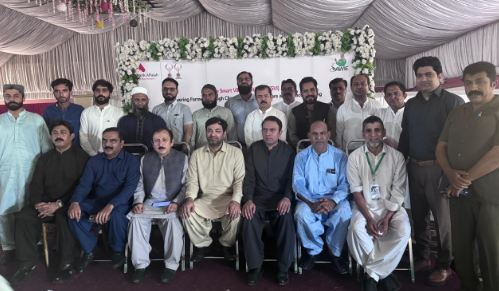ISLAMABAD, AUG 6 /DNA/ – The Climate Smart Village Initiative (CSVI) was officially launched on August 4, 2025, at Lok Virsa Hall in Karor, Layyah, in a landmark event jointly organized by SAWiE Ecosystems Pvt. Ltd and Bank Alfalah.
The event brought together key stakeholders from government departments, academia, financial institutions, development partners, technology providers, and rural farming communities to mark the beginning of a transformative approach to agriculture in Pakistan. The CSVI is designed as a regenerative, climate-smart farming model that empowers smallholder farmers through digital advisory tools, sustainable agricultural practices, and access to green finance.
During the event, three pilot Climate Smart Villages were announced in Faisalabad, Vehari, and Layyah, each tailored to reflect the specific cropping systems and environmental conditions of their respective regions. Dr. Khalid Mahmood, Co-founder of SAWiE Ecosystems, introduced the initiative as a strategic response to the escalating challenges of climate change affecting Pakistan’s agriculture. He emphasized the integration of regenerative practices, digital innovation, and inclusive finance as a model to empower smallholders with the knowledge, tools, and incentives necessary for long-term sustainability.
Mr. Muhammad Yahya Wahla, Head of Agri Business at Bank Alfalah, reaffirmed the bank’s commitment to facilitating the transition toward sustainable agriculture by developing climate-aligned financial products, risk-sharing mechanisms, and farmer-focused credit lines. Punjab Assembly Member Ms. Somia Atta Shahani commended the inclusive nature of the initiative, particularly its emphasis on engaging youth and women, and encouraged the replication of the model in underserved areas through integration into provincial development strategies.
Experts from leading academic institutions and development agencies shared their insights on the scientific and technical aspects of climate-smart agriculture. Dr. Ishfaq Ahmad, Consultant to the Asian Development Bank, called for the development of a national measurement, reporting, and verification (MRV) framework to enable Pakistani farmers to access climate finance opportunities under the Paris Agreement. Professors from Ghazi University, the University of Agriculture Faisalabad, and Muhammad Nawaz Sharif University of Agriculture stressed the importance of university-led research in validating regenerative techniques. Additionally, experts from Ghulam Ishaq Khan Institute and BUITEMS showcased how artificial intelligence, remote sensing, and predictive analytics can enhance farm-level decision-making and climate risk reduction.
The launch of CSVI marks a significant step toward building climate-resilient and sustainable farming systems in Pakistan. The initiative has laid the foundation for a multi-stakeholder movement to promote regenerative agriculture, digital innovation, and inclusive rural development.

















